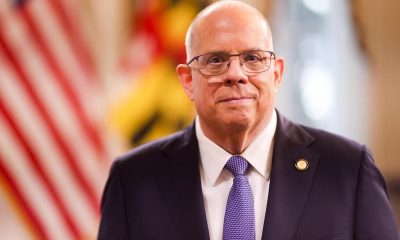Local
‘Political reality’ forces changes to Md. trans bill
Some angry over removal of public accommodations clause as hearing looms

Supporters and opponents were expected to turn out in force on March 9 for a hearing on a bill before a Maryland House of Delegates committee that calls for prohibiting discrimination against transgender people in employment and housing.
Officials with the statewide LGBT group Equality Maryland said they were hopeful that the hearing before the Health and Government Operations Committee would be the first step leading to the bill’s approval this year by the Maryland Legislature, marking a historic first for transgender rights.
But political insiders at the state capital in Annapolis said supporters were bracing for possible vocal opposition to the bill from some transgender activists, who have expressed anger over a decision by the bill’s lead sponsor to remove a provision banning discrimination in public accommodations, such as hotels, restaurants, private health clubs and gyms.
Some of the bill’s supporters worry that testimony against the bill from transgender people combined with the expected opposition from various religious leaders and social conservatives could be a devastating blow to the legislation.
Others, such as veteran transgender advocate Dana Beyer, a former candidate for a House of Delegates seat from Montgomery County, say other transgender activists such as she will voice support for the bill, countering those who oppose it.
Del. Joseline Pena-Melnyk (D-Prince George’s and Anne Arundel Counties), a strong supporter of LGBT equality who has sponsored a transgender rights bill in the legislature since 2007, said she removed the public accommodations provision this year after determining it was the only way to obtain enough votes to pass the legislation.
“The bottom line is discrimination is not right,” she told the Blade Wednesday. “I have had this bill now for over three years and initially I introduced it with the section on public accommodations, which I believe in. “
Pena-Melnyk said she determined that the “political reality” required that she make changes in the bill to line up the votes needed to pass it. She said she understands the frustration of transgender Marylanders who wanted the public accommodations provision to remain in the bill.
“But I also feel it’s the right thing to do to give people protection under the law,” she said. “It’s better than nothing. A half a load is better than no load at all.”
Equality Maryland Executive Director Morgan Meneses-Sheets said the group agrees with Pena-Melnyk’s decision to drop the public accommodations provision, with the intent of going back to the legislature next year to put public accommodations back in after the measure passes.
Noting that supporters were unable to get the bill out of committee during the past three years, Meneses-Sheets said most supporters believe an incremental strategy of advancing employment and housing protections for transgender people this year is a “far better” option than seeing the bill go down to defeat and having no protections at all.
“This helps folks right now with discrimination that they’re facing in jobs and housing,” she said. “This is a huge problem. And the housing protections are not only for housing you immediately think of like renting an apartment. In Maryland, housing is also interpreted to cover shelters.”
She noted that studies in the state show that as many as 12 percent of transgender Marylanders have experienced homelessness – sometimes due to employment discrimination that results in the loss of a job or housing discrimination resulting in the loss of an apartment.
Beyer said she, too, reluctantly has come out in support of the bill.
“The bottom line is we didn’t pass this in ‘07, we didn’t pass it in ‘08, ‘09 or last year,” she said. “So if we can get something done and we get a commitment from the community to come back next year, that’s the best we can do under the circumstances.”
Added Beyer: “It’s not ideal. We should have done it better before. But this is where we are today. People are suffering and it needs to get done.”
Beyer and others familiar with the Maryland Legislature said the decision to drop the public accommodations provision was driven by sensational claims by opponents that certain businesses like gyms and health clubs would be forced to allow male cross-dressers to use female locker rooms and bathrooms under the provision.
Those raising this concern warn that allowing male-to-female transgender people to use women’s bathroom facilities would jeopardize the safety of women, even though supporters of transgender rights legislation say such problems have not surfaced in any of the states, cities or towns that have adopted trans rights laws.
Opponents of the bill, led by some of the same anti-LGBT groups that oppose same-sex marriage, often have cited religious beliefs as grounds for denying non-discrimination protections for transgender people.
Some of the opposition to the bill from transgender activists has come from out-of-state bloggers who argue that passing a “bad” transgender law in Maryland would set a precedent that could hurt efforts to pass laws in other states.
Trans activist Monica Roberts of Texas wrote in Feb. 15 blog posting that gay and lesbian activists, led by Equality Maryland, were devoting most of their efforts to passing a same-sex marriage bill while failing to devote the attention needed to pass a stronger trans bill.
Closer to home, Sandy Rawls, a transgender activist who heads the group Trans-United, announced her opposition to the bill last month.
“Due to public outrage and disappointment of taking public accommodations out of Maryland House Bill 235, I … reviewed the facts with legal representation. As a result, Trans-United is pulling its support for the proposed legislation.”
A press conference scheduled for this week on the bill was postponed until March 9.
District of Columbia
Gay ANC member announces candidacy for Ward 1 D.C. Council seat
Community leader Brian Footer seeking seat held by Brianne Nadeau

Gay Advisory Neighborhood Commissioner Brian Footer, a community activist who has been involved for many years in local and national government affairs, has announced his candidacy for the Ward 1 D.C. Council seat up for election in 2026.
Footer, a Democrat, will be running in the city’s June 2, 2026, Democratic primary for the Ward 1 Council seat, but it is uncertain whether he will be running against incumbent Ward 1 Council member Brianne Nadeau (D). Nadeau has not yet announced if she plans to run for re-election for a fourth term following her 12 years on the Council.
Nadeau has been a longtime vocal supporter of the LGBTQ community.
If Footer were to win the primary and the November 2026 general election, he would become the Council’s second openly gay member. Ward 5 Council member Zachary Parker (D) is currently the 13-member Council’s only gay member.
Footer is a three-term ANC commissioner who currently serves as Chair of ANC 1E, which represents the city’s Adams Morgan neighborhood.
“Brian has worked at every level of government — federal, state, and local — building a career rooted in public service, aging policy, and inclusive urban planning,” a statement on his campaign website says.
“I’m running for Council because too many people in Ward 1 are doing everything right and still feel ignored by the city they call home,” Footer states on his website.
“I’m running because we can do better,” his statement continues. “That means making housing more affordable, addressing homelessness with real solutions, and keeping our neighborhoods safe with smart, community focused strategies.”
When contacted by the Washington Blade for comment, Nadeau said she was not ready at this time to discuss her plans about running again or about Footer’s candidacy.
“The primary is a ways away, and I’m very focused right now on the budget and the stadium deal and all the work that we’re doing at the Council,” she told the Blade. “So, I really haven’t had time to turn to my plans. So, as a result, I’m also not going to be commenting on anybody else who is determined that they’re running at this time.”
She first won election to the Council in 2014 after she defeated four-term gay Ward 1 Council member Jim Graham in the Democratic primary after Graham became embroiled in an ethics controversy.
In the 2022 Democratic primary Nadeau defeated gay challenger Salah Czapary in a three-candidate race, by a margin of 48.5% of the vote compared to Czapary’s 30.9%.
With the third candidate, Sabel Harris, receiving 20.4%, the outcome showed that the two challengers had a combined total vote count higher than Nadeau.
Further details of Footer’s candidacy can be accessed from his campaign website, brianfooterdc.com.
District of Columbia
Gay GOP group hosts Ernst, 3 House members — all of whom oppose Equality Act
Log Cabin, congressional guest speakers mum on June 25 event

U.S. Sen. Joni Ernst (R-Iowa) and three women Republican members of the U.S. House appeared as guest speakers at the June 25 meeting of Log Cabin Republicans of D.C., the local chapter of the national LGBTQ Republican group with that same name.
The U.S. House members who joined Ernst as guest speakers at the Log Cabin meeting were Celeste Maloy (R-Utah), Kat Cammack (R-Fla.), and Julia Letlow (R-La.).
Neither D.C. Log Cabin Republicans President Andrew Minik nor spokespersons for Ernst or the three congresswomen immediately responded to a request by the Washington Blade for comment on the GOP lawmakers’ appearance at an LGBTQ GOP group’s meeting.
“Please join us for an inspiring evening as we celebrate and recognize the bold leadership and accomplishments of Republican women in Congress,” a D.C Log Cabin announcement sent to its members states.
“This month’s meeting will highlight the efforts of the Republican Women’s Caucus and explore key issues such as the Protection of Women and Girls In Sports Act and the broader fight to preserve women’s spaces in society,” the message says.
It was referring to legislation pending in Congress calling for banning transgender women from participating in women’s sports events.
According to media reports, Ernst and the three congresswomen have expressed opposition to the Equality Act, the longstanding bill pending in Congress calling for prohibiting discrimination based on sexual orientation and gender identity in the areas of employment, housing, and public accommodations.
The Log Cabin announcement says the meeting was scheduled to take place at the Royal Sands Social Club, which is a restaurant and bar at 26 N St., S.E. in the city’s Navy Yard area.
D.C. Log Cabin member Stuart West, who attended the meeting, confirmed that Ernst and the three congresswomen showed up and spoke at the event.
“It was a good turnout,” he said. “I would definitely say probably 30 or 40 people attended.” West added, “Four women came to talk to a group of mostly gay men. That’s something you don’t see very often.”
District of Columbia
D.C. police seek public’s help in July 5 murder of trans woman
Relative disputes initial decision not to list case as hate crime

D.C. police are seeking help from the public in their investigation into the murder of a transgender woman who they say was shot to death at about 12:30 a.m. on Saturday, July 5, on the 2000 block of Benning Road, N.E.
But the police announcement of the fatal shooting and a police report obtained by the Washington Blade do not identify the victim, 28-year-old Daquane ‘Dream’ Johnson of Northeast D.C., as transgender. And the police report says the shooting is not currently listed as a suspected hate crime.
It was local transgender activists and one of Johnson’s family members, her aunt, who confirmed she was transgender and said information they obtained indicates the killing could have been a hate crime.
“On Saturday, July 5, at approximately 12:51 a.m., Sixth District officers were flagged down in the 2000 block of Benning Road, Northeast, for an unconscious female,” a July 5 D.C. police statement says. “Upon arrival, officers located an adult female victim suffering from gunshot wounds,” it says.
“D.C. Fire and EMS responded to the scene and transported the victim to a local hospital where after all lifesaving efforts failed and the victim was pronounced dead,” the statement says.
A separate police flyer with a photo of Johnson announces an award of $25,000 was being offered for information leading to the arrest and conviction of the person or persons responsible for the murder.
The flyer identifies D.C. police Homicide Detective Natasha Kennedy as being the lead investigator in the case and says anyone with information about the case should contact her at 202-380-6198.
Longtime D.C. transgender rights advocate Earline Budd told the Blade that one of the police investigators contacted her about the case and that she also spoke to Detective Kennedy. Budd said police confirmed to her that Johnson was a transgender woman.

One of Johnson’s family members, Vanna Terrell, who identified herself as Johnson’s aunt, told the Blade that Johnson used the first name of Dream and had planned to legally adopt that name instead of Daquane but had not gotten around to doing so.
Terrell said she and other family members learned more about the incident when one of two teenage high school students who knew Johnson’s brother contacted a friend and told the friend that they recognized Johnson as they witnessed the shooting. Terrell said the friend then called her to tell her what the friend learned from the two witnesses.
According to Terrell, the witnesses reportedly saw three men approach Johnson as Johnson walked along Benning Road and one of them called Johnson a derogatory name, leading Terrell to believe the men recognized Johnson as a transgender woman.
Terrell said one of the witnesses told the friend, who spoke to Terrell, that the man who shot Johnson kept shooting her until all of the bullets were fired. Budd, who said she spoke to Terrell, who also told her what the witnesses reported, said she believed the multiple shots fired by the shooter was an “overkill” that appears to have been a hate crime. Terrell said she too believes the murder was a hate crime.
In response to an inquiry from the Blade, Officer Ebony Major, a D.C. police spokesperson, stated in an email, “At this point there is nothing in the investigation that indicates the offense was motivated by hate or bias.”
Terrell said a memorial gathering to honor Johnson’s life was scheduled to be held Saturday, July 12, at River Terrace Park, which is located at 500 36th St., N.E. not far from where the shooting occurred.

-

 Federal Government2 days ago
Federal Government2 days agoTreasury Department has a gay secretary but LGBTQ staff are under siege
-

 Virginia3 days ago
Virginia3 days agoDefying trends, new LGBTQ center opens in rural Winchester, Va.
-

 District of Columbia2 days ago
District of Columbia2 days agoGay GOP group hosts Ernst, 3 House members — all of whom oppose Equality Act
-

 Opinions4 days ago
Opinions4 days agoUSAID’s demise: America’s global betrayal of trust with LGBTQ people












